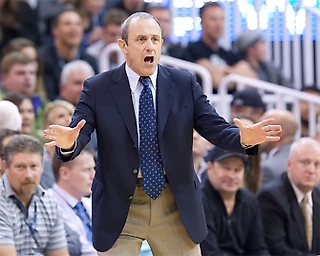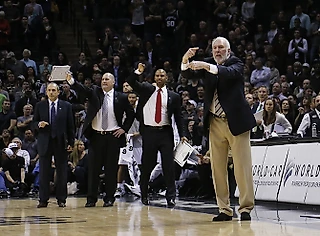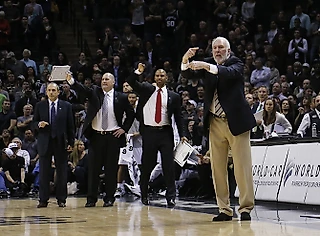Deeper than anger
Many friends of mine ask me about the way I motivate people. Sometimes they invite me to speak in organizations that have nothing to do with sports.
Let's start with a common misconception. I heard many times that a good coach is supposed to be able to inspire the team by a speech in the locker room. And those players perform at a higher level in the second half only because the coach encouraged them with some magic words.
Sometimes it works, but not very often. Let me explain why.
First of all, motivation cannot be created from nothing. You can only help your players or employees to find a source of motivation inside themselves.
Motivation can be either 1) a reaction to something bad and dangerous (I call it "motivation against something, somebody"), 2) or an effect of players' self-confidence and personal responsibility.
Let's get down to the first one.
It's really easy to motivate people against something or somebody aggressive, bad or meant to put us in trouble. This motivation is based on anger or other strong negative emotions and requires a lot of mental energy to be burnt. Therefore it might provoke an incredibly powerful reaction which will last only for a short time.
You'd better use it occasionally, only in special situations.
Our last game against Benetton in Treviso was a very special one. Emanuele Molin and I worked there for 3 seasons, Langdon played for Treviso and won the national championship, Smodis, Vanterpool, Andersen and Van Den Spiegel were rivals with Treviso for a long time. The arena was full, all tickets sold out. It doesn't happen often in Treviso during regular season. Our main motivation was not just to win, but to show them that we are a part of a very strong team, a great club, to show that we are good enough to win in Treviso.
Remember, you cannot stay angry or hyperaggressive with somebody for 9 months a year. You cannot always get mad with your team. You should rely on something deeper than anger, if you want your team to perform better on a daily basis.
If you insist on "motivation against something", you risk poisoning your relationship with the other members of the team, as this kind of motivation is mainly negative.
However when you play in Italy or Greece, you need to be aggressive to cope with the outside pressure. You can feel the pressure physically there so it can scare you at first. To overcome the pressure you need to be extremely aggressive. In Russia, for instance, the atmosphere is very nice and polite.
People cannot always have the same level of aggressiveness. I admit that sometimes I use my players to compensate for my lack of aggressiveness and vice versa.
Aggressiveness has its side-effect. It always goes with anxiety. Level of aggressiveness is closely related to the level of anxiety.
The psychology of basketball is very different from, let's say, football psychology. In a football game (during regular season) you can become less aggressive and more conservative because the tie seems to be an acceptable result for you. You can mentally accept to play for the tie.
In basketball you always need to be reasonably aggressive. If you're too aggressive, you're too anxious as well. Being too anxious usually makes you want to win the game within 5 minutes or to be up by 10-15 points early in the game. You want to close the deal quick and you want it badly. It causes a lot of mistakes and you are usually trailed by 10-15 points by the end of the game. When you go down by a few points, and you're too anxious, it might completely destroy your mental preparation for the game.
You should be mentally ready to suffer for 40 minutes
It's extremely difficult to play "up 2 – tie - down 2" kind of game. It's similar to professional boxing where you should be patient for 10 rounds to win in the last 2.
In basketball 90% of the big games are settled in the last quarter or even in the last possession. To win these games you must combine aggressiveness and patience.
My job is to control the level of anxiety before big games. Pressure and fear usually paralyses people.
This is why defense is very important. If you're under pressure and you manage to use it to play defense in a more physical way, the pressure usually goes down.
Basketball is a very special kind of sports. If you cannot control your emotions, it becomes very difficult for you to do anything technically. Especially, in offense. Even under the biggest pressure, to make a shot you need to go in the air and shoot smoothly. You cannot just hit the ball.
Now, let me get back to self-confidence and personal responsibility as a sources of motivation.
A sense of responsibility towards the teammates is probably one the most powerful source of motivation. Basic level of responsibility is all about not letting teammates down. As your confidence grows up, you might advance to the next level - want to win something with the team.
Suppose your goal is not to let people down. You will play a conservative way, without taking any substantial risks. It's like going to casino and betting only red and black. To win you need to take more risks, to be more mentally aggressive.
In my opinion, to win something you must accept the idea of losing first.
I don't believe in motivating people by telling them they are stronger, they are better, they must go and beat the opponents and win the game. It doesn't seem realistic to me.
I feel it's more like "we're stronger if we do this, this and this. And we don't let our rival do that and that. Otherwise they might be stronger than we are". I think the best way to stay strong is to be aware of your strengths, weaknesses and to know how to use your strengths and hide your weaknesses. That means you must know what your weaknesses are.
This understanding of your strengths and weaknesses is also a source of your confidence and personal responsibility.
The most difficult situation for me is to keep my team motivated when we lead by 20 points. When you have a very experienced team, like CSKA, once you are up by 20, players instinctively start thinking about the next game. It might be a good idea to use young players, but it's tricky. Young players can easily lose advantage within 2-3 minutes. The best option is to find the right balance between young and experienced players. I tried to put Kurbanov in starting five to always have a combination of 1-2 young players with 3 veterans. It worked out in last games of Russian championship.
Another big challenge for me is regular games, so called "easy games". To tell you the truth, if you are not serious about these games, they are not easy at all. The level of responsibility is helping a lot. We have extremely serious players in CSKA. That means they will never adjust their level of the game to the opponent. To keep people motivated for regular games, I try to concentrate on the level of our game, the level of technical performance. I work to raise that level. We're like violinists or pianists, practicing every day to improve our skills.
To sum up, an emotional part of motivation is very important. You cannot be 100% rational. However you need to be in control with your emotions, not to put yourself into a situation you cannot handle. This self-control is essential in order to be able to choose the best option for your team.
You need to find that delicate balance between pressure and cheering up depending on the situation. One thing I know - it's not always the same.




